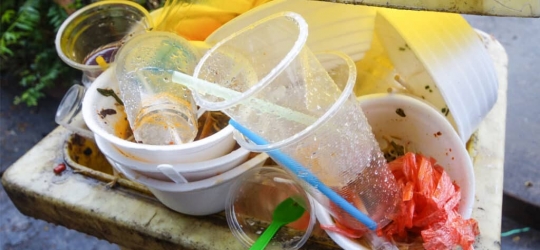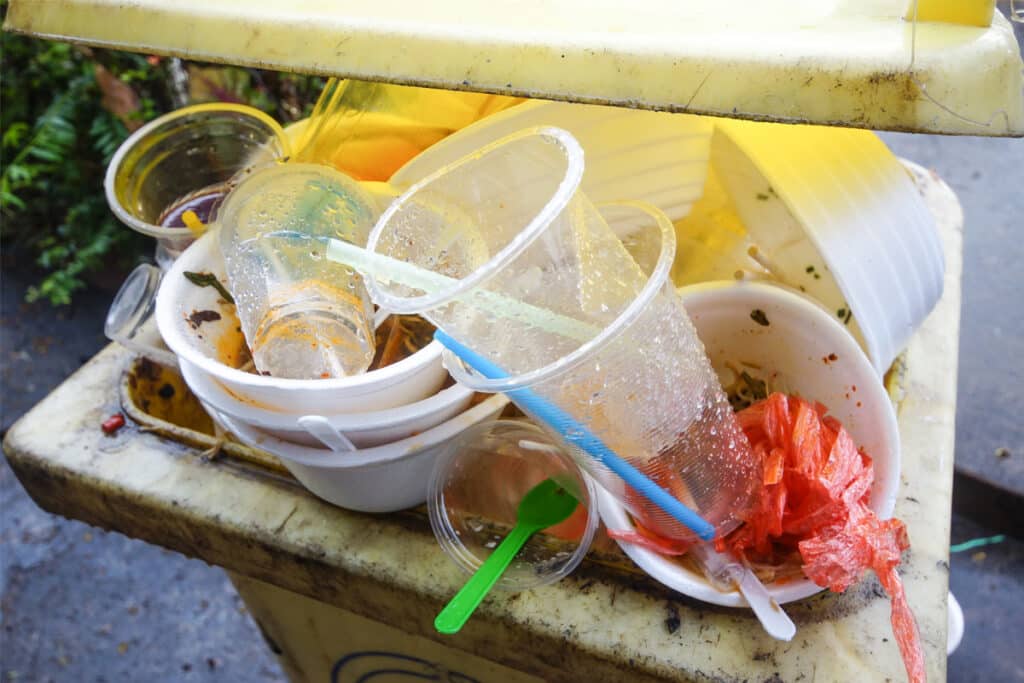
Is kerbside collection the dumping ground for FMCG packaging? – Australia
Posted on February 23, 2023 by DrRossH in Plastic Recycling
The proposal from the Australian Food and Grocery Council (AFGC) for a National Plastics Recycling Scheme (NPRS) is being met with considerable scepticism. The failure of industry to meet the national voluntary packaging targets hampers the credibility of this latest proposal, which is based on kerbside collection.
The NPRS is seeking to embed council-funded kerbside collections as the primary collection mode for soft plastics (following the recent REDcycle challenges), with a number of ‘orange-bag’ trials currently underway. However, we don’t yet know whether this approach, of a separate soft plastics bag in kerbside bins, works or whether it will simply add to existing contamination problems in kerbside.
The NPRS is being presented as a form of Extended Producer Responsibility (EPR) potentially modelled on schemes such as Belgium’s ‘Fost Plus’ packaging EPR scheme.
However, the proposal to date from the NPRS is they would not be meeting council collection costs or MRF processing etcetera. A recent AFGC webinar outlined that the costs and benefits should be seen through the lens of existing kerbside programs. That is, councils should be rejoicing at possible cost savings from some soft plastics being removed from the body of the bin and possible lower landfill costs. I’m not hearing that they are, and in fact many are seeing the NPRS as just another industry exercise to avoid costs of packaging recovery.
Kerbside has for too long been the cost-free dumping ground for food and beverage producers. The AFGC won’t be proposing to government they now pick up some of these kerbside costs. The time for a mandated true-packaging-EPR program is long overdue and Federal Minister for the Environment and Water, Tanya Plibersek, must step in.
A per kilo eco modulated EPR fee should be placed on all packaging put to market (plastics more expensive than cardboard etc); if kerbside recovery of some of these materials is viable (works) a relevant portion of these fees would be reimbursed to councils, MRF upgrades etc; additional program fees would be utilised for other collection streams, from retail etc
An eco-modulated fee would also serve to change packaging design (quantities, recyclability, materials) by making more sustainable formats cheaper.
The NPRS framework is a good starting point and the apparent REDcycle crisis is a circuit breaker. We cannot go back to industry leaving ratepayers and kerbside collections to pick up the bill, or expect various voluntary targets to give enough certainty to recyclers to invest in reprocessing facilities.

 How many people today grab a takeaway coffee cup from the local cafe to drink on the go? We don’t know, but the number must be enormous.. Most every one of the above have a plastic top that will last 100s of years. Some cafes still use plastic cups that last a similar time. Is 10 minutes of coffee worth 100s of years of trash?
These items can be seen littering our gutters and on our streets all over the place. If they were all cardboard, they would still be littered, but they would, at least, be gone in a short time.
They do not need to be made of plastic.
How many people today grab a takeaway coffee cup from the local cafe to drink on the go? We don’t know, but the number must be enormous.. Most every one of the above have a plastic top that will last 100s of years. Some cafes still use plastic cups that last a similar time. Is 10 minutes of coffee worth 100s of years of trash?
These items can be seen littering our gutters and on our streets all over the place. If they were all cardboard, they would still be littered, but they would, at least, be gone in a short time.
They do not need to be made of plastic.
 On the way home from the gym last week, a distance of about 1 km (1/2 mile), I counted the items of plastic litter on the curb as I walked. In that short distance I counted 63 pieces of plastic litter. Plastic drink bottles, bottle tops, candy wrappers, plastic film, polystyrene fragments etc. That seemed to be a lot to me. I guess it is a generational thing. Our parents would have been horrified to see that amount, whereas it seems to go unnoticed by our youth of today. In another 20 years how many pieces will there be on this stretch, -- 200? What will today’s youth think of that new amount then when they are older? Will their children be so readily accepting of a higher amount of litter?
On the way home from the gym last week, a distance of about 1 km (1/2 mile), I counted the items of plastic litter on the curb as I walked. In that short distance I counted 63 pieces of plastic litter. Plastic drink bottles, bottle tops, candy wrappers, plastic film, polystyrene fragments etc. That seemed to be a lot to me. I guess it is a generational thing. Our parents would have been horrified to see that amount, whereas it seems to go unnoticed by our youth of today. In another 20 years how many pieces will there be on this stretch, -- 200? What will today’s youth think of that new amount then when they are older? Will their children be so readily accepting of a higher amount of litter?
Discussion · No Comments
There are no responses to "Is kerbside collection the dumping ground for FMCG packaging? – Australia". Comments are closed for this post.Oops! Sorry, comments are closed at this time. Please try again later.